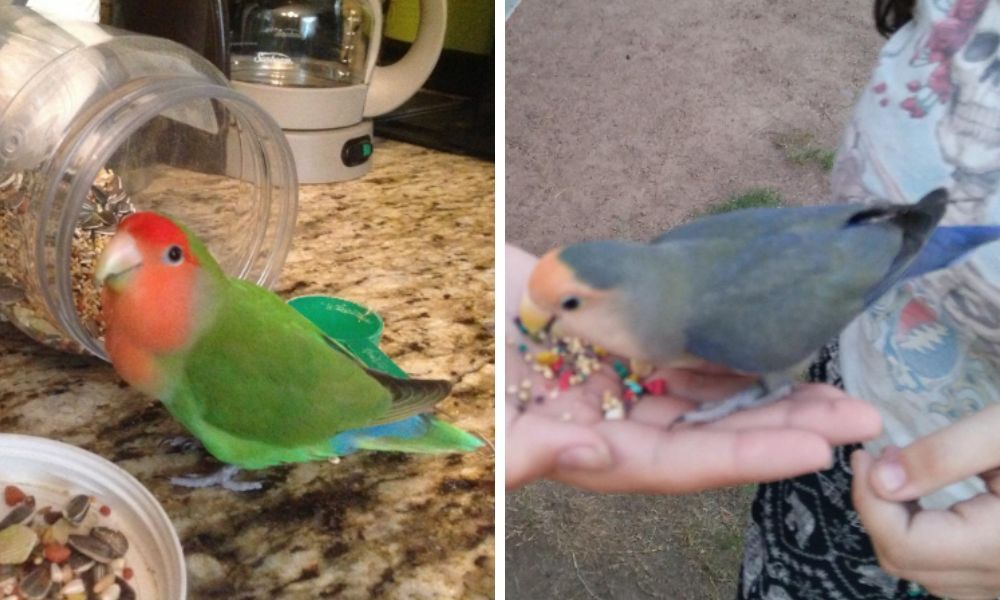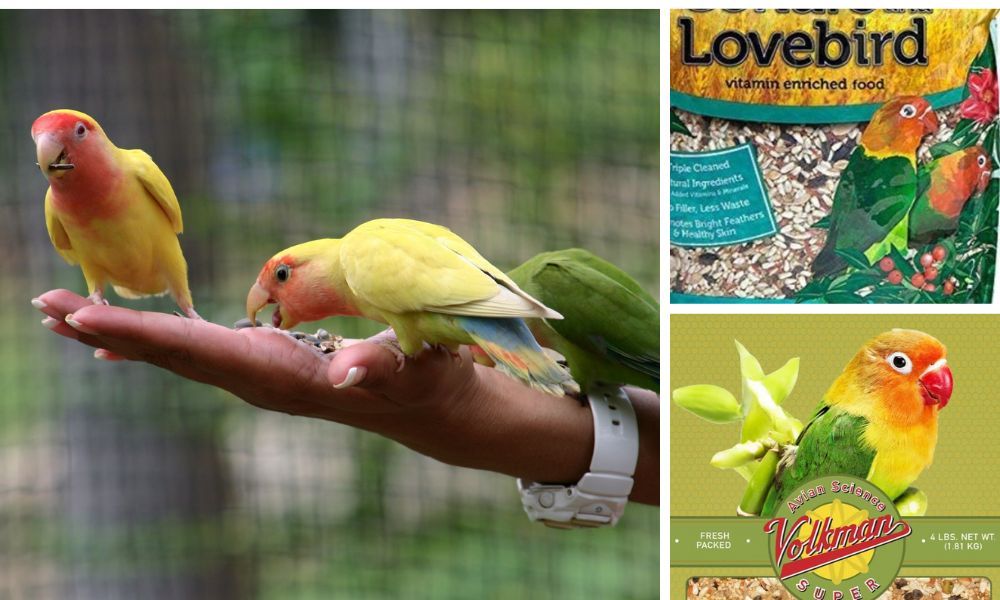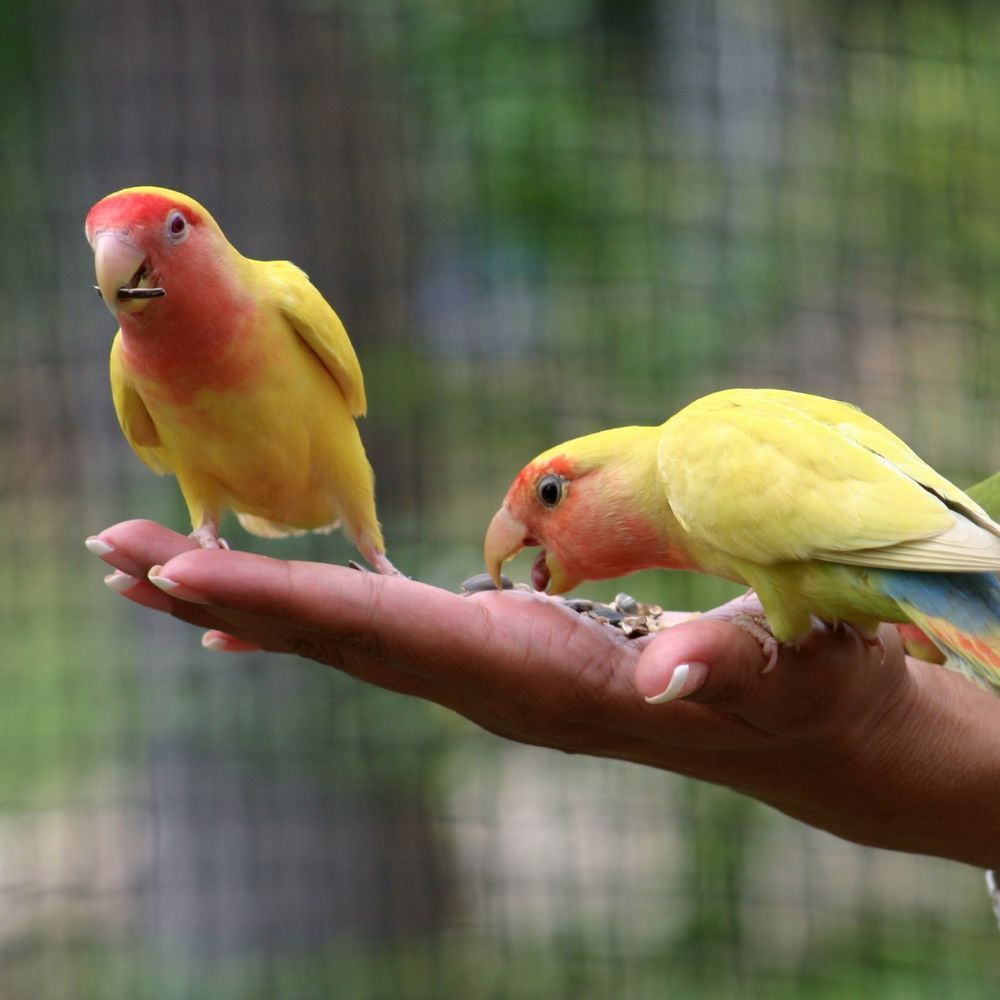Complete Guide to a Balanced Love Birds Food: Seeds, Fruits and More
Do you have love birds at home that aren't getting the nutrition they need? Discover how to give them a balanced diet of delicious seeds, fruits, etc.

Key Takeaways:
- A balanced diet for love birds includes a mix of seeds, fruits, vegetables, and formulated diets.
- Commercial seed mixes alone provide very little nutritional value and should be supplemented with other nutritious food items.
- Fresh water and proper food and water dishes are essential for maintaining a love bird's health.
Introduction
Love birds are charming, vibrant, and full of life. As pet birds, they require a balanced diet to thrive. Many owners assume that a seed diet is sufficient, but this can lead to poor nutrition and health problems. This guide will help you understand the importance of a varied diet, including seeds, fruits, vegetables, and formulated diets, to ensure your love birds live a long, healthy life. In this post, we will be delving deeper into the nutritional requirements of your feathered friends, exploring the different food options available to them, and discussing how you can create a balanced love birds food diet.
The Importance of a Balanced Diet
A balanced diet is crucial for love birds. While seeds are a staple, they offer very little nutritional value on their own. A diet consisting solely of seeds can lead to deficiencies in essential vitamins and minerals, resulting in ill health. To provide a proper diet, it's important to include a variety of foods that mimic what wild lovebirds eat.

Commercial seed mixes are convenient but should not be the sole component of your bird's diet. These mixes often lack the necessary nutrients and can lead to an imbalanced source of nutrition. Incorporating fresh fruits, vegetables, and formulated diets can help ensure your love birds receive the nutrients they need.
Seeds: The Good and the Bad
Seeds are a natural part of a love bird's diet, but not all seeds are created equal. Millet seed, for example, is a favorite among love birds but should be given in moderation due to its high-fat content. Millet spray can be a great treat, especially for extremely young or hand-raised babies.
However, relying solely on seeds can lead to poor nutrition. Seeds lack certain vitamins and amino acids essential for a bird's health. It's important to offer a variety of seed types and combine them with other nutritious food items to create a balanced diet. Please always monitor the amount of food eaten every day by each bird.
Fruits and Vegetables: Adding Variety
Fresh fruits and vegetables are vital for a love bird's diet. They provide essential vitamins and minerals that seeds alone cannot offer. Suggested food items include apples, carrots, spinach, and bell peppers. These foods should be washed thoroughly to remove any chemicals and offered in small, manageable pieces.
It's important to note that some fruits and vegetables can be potentially toxic to love birds. Avoid feeding them avocado, chocolate, and any foods containing caffeine or alcoholic beverages. Always research and use common sense when introducing new foods to your bird's diet.
Formulated Diets: Pellets and More
Formulated diets, such as pelleted diets, are designed to provide a complete and balanced nutrition for love birds. These diets are created to meet the specific needs of different species and life stages. Pellets can be a great way to ensure your bird receives all the necessary nutrients without the guesswork.
Converting seed-eating birds to a pelleted diet can be challenging but is often worth the effort. Start by mixing pellets with seeds and gradually increase the pellet ratio. This method helps birds adjust to the new food without causing stress.
Food and Water Dishes: Keeping It Clean
Proper food and water dishes are essential for maintaining your love bird's health. Use separate dishes for food and water to prevent contamination. Clean these dishes daily to avoid the buildup of bacteria and mold, which can lead to health problems.
Fresh water should always be available. Birds have a heightened awareness of water quality, and dirty water can deter them from drinking. Ensure the water is clean and free from any additives that could harm your bird.
Supplements: When and Why
In some cases, supplements may be necessary to ensure your love birds receive a proper balance of nutrients. Calcium supplementation is particularly important for laying eggs and maintaining strong bones. Powdered supplements can be added to food or water but should be used sparingly and under the guidance of a veterinarian.
Extra vitamins and conditioning foods can be beneficial during stressful times, such as molting or raising young. However, it's important not to over-supplement, as this can lead to imbalances and health issues.
Common Mistakes and How to Avoid Them
One common mistake owners make is offering too many seeds and not enough variety. This can lead to poor nutrition and health problems. Always strive to provide a varied diet that includes fresh fruits, vegetables, and formulated diets.
Another mistake is neglecting to clean food and water dishes regularly. Dirty dishes can harbor bacteria and mold, leading to illness. Make it a habit to clean these dishes daily to ensure your bird's health.
Case Study: Transitioning to a Balanced Diet
Consider the story of Bella, a love bird who was initially fed a seed-only diet. Bella's owner noticed she was lethargic and had dull feathers. After consulting with a veterinarian, they decided to transition Bella to a more balanced diet, including fresh fruits, vegetables, and a pelleted diet.
The transition took time, but Bella's health improved significantly. Her feathers became vibrant, and she regained her energy. This case highlights the importance of a balanced diet and the positive impact it can have on a bird's life.
Summary
Providing a balanced diet for your love birds is essential for their health and well-being. While seeds are a natural part of their diet, they should be supplemented with fresh fruits, vegetables, and formulated diets to ensure they receive all the necessary nutrients. Proper food and water dishes, along with occasional supplements, can help maintain your bird's health. By avoiding common mistakes and continually striving to offer a varied diet, you can ensure your love birds live a long, healthy life.
FAQ
What fruits and vegetables are safe for love birds?
Safe fruits and vegetables for love birds include apples, carrots, spinach, and bell peppers. Always wash these foods thoroughly to remove any chemicals and offer them in small, manageable pieces.
How can I transition my love bird from a seed diet to a pelleted diet?
Start by mixing pellets with seeds and gradually increase the pellet ratio. This method helps birds adjust to the new food without causing stress. Be patient, as the transition can take time.
Are there any foods I should avoid feeding my love birds?
Yes, avoid feeding your love birds avocado, chocolate, and any foods containing caffeine or alcoholic beverages. These can be potentially toxic to birds. Always research and use common sense when introducing new foods to your bird's diet.
What is the best food for lovebirds?
The best food for lovebirds is a balanced diet that consists of fresh fruits, vegetables, legumes, seedy grains, and fortified pellet food. Seeds should make up no more than 25% of the diet as they are too high in fat. You should select a blend of high-quality bird food wiht an excellent source of nutritious ingredients. Additionally uou can provide seed mix. The seed mix that you feed your lovebirds should consist of a variety of seeds, not just one type. You can mix hemp seeds, canary seeds, oats, sunflower seeds, sesame seeds and millets. Wild Lovebirds would eat a great variety of seed types in the wild as different plants come into season.
How to choose the best bird food for lovebirds?
When choosing bird food for lovebirds, you should look for a blend of high-quality bird food with an excellent source of nutritious ingredients. It is important to avoid seed mixes that are mostly sunflower seeds, as these are too high in fat. Additionally, avoid seed mixes with lots of filler and additives. You can also mix hemp seeds, canary seeds, oats, sunflower seeds, sesame seeds and millets. These should make up no more than 25% of the diet as they are too high in fat. Lastly, select a food that is fortified with essential vitamins and minerals to ensure your lovebird gets adequate nutrition.

What vegetables can lovebirds eat?
Lovebirds can enjoy a variety of fresh foods and vegetables such as broccoli, carrots, sweet potatoes, spinach, and peas. You should remove any uneaten parts daily to ensure they don't spoil the cage.
What veggies can love birds eat?
Lovebirds can eat a variety of fresh vegetables including cucumber, bell peppers, celery, zucchini, squash, asparagus, and cauliflower. These should be offered in small pieces for your pet to enjoy. Leafy greens like kale and spinach are also healthy options for lovebirds, but should only be given in small amounts due to their oxalic acid content. Lovebirds eat a variety of seeds, fruits, berries and vegetation such as leaf buds in the wild.
What fruits can lovebirds eat?
Lovebirds can enjoy a variety of fresh fruits including apples, pears, grapes, melons, and berries. You should always remove any uneaten parts daily to avoid spoiling the cage. Citrus fruits like oranges and lemons are also healthy options for lovebirds, but should only be offered in moderation due to their acidity.
What food can lovebirds not eat?
Lovebirds should not eat chocolate, avocados, alcohol, and caffeine as these are toxic to them. Sugary foods like cookies and cake should also be avoided as they can cause health problems such as weight gain and obesity. Additionally, processed foods that are high in salt and preservatives should be avoided.
Do lovebirds eat banana?
Yes! Bananas are a great treat for your lovebird. However, you should remove any uneaten parts daily to avoid spoiling the cage. You should also limit the amount of banana offered as too much can cause digestive issues. Fresh bananas are better than dried ones as they contain more vitamins and minerals.
Can love birds eat cucumber?
Yes! Cucumbers are a great source of vitamins and minerals and can form a part of your lovebird's diet. Make sure to cut it into smaller pieces so that your pet can eat it easily. As with other fruits and vegetables, you should remove any uneaten parts daily to stop them from spoiling the cage.

Can love birds eat rice?
Yes! Cooked brown or white rice can be offered as a treat to your lovebird, but it should be offered in moderation and not daily. Make sure to prepare the rice without any added salt, sugar, oil or butter for the best health benefits. You should also remove any uneaten parts daily.
Treating your pet birds to a diverse and balanced diet is essential for their health and wellbeing. Incorporating different food sources into their diet helps to ensure they are getting all the nutrients they need, while also providing them with varied tastes and textures that will keep them entertained. With a little bit of planning and research, you can make sure your pet's diet meets their dietary requirements.
Is Egg good for lovebirds?
Yes! Eggs are an excellent source of protein and essential vitamins. They can form a part of your lovebird's diet, as long as they are offered in moderation. You should always cook the eggs before feeding them to your pet bird for safety reasons. If the eggshells are not cooked sufficiently, it can cause digestive issues or even lead to salmonella poisoning.
Can lovebirds eat peanut butter?
No, lovebirds should not eat peanut butter. Peanut butter is high in fat and can cause digestive issues for your pet birds. Additionally, some brands of peanut butter contain added sugar and salt which are bad for your lovebirds' health. Instead, you can offer them unsalted nuts such as almonds or walnuts as occasional treats.
What nutritious food is good for my lovebird?
A balanced diet for your lovebird should include a variety of nutritious ingredients such as fresh fruits and vegetables, fortified pellet food, legumes, seedy grains, and protein sources like egg. Seeds should make up no more than 25% of the diet as they are too high in fat. You can also offer cooked brown or white rice and boiled eggs occasionally as treats. Make sure to remove any uneaten parts daily to avoid spoiling the cage.
Can lovebirds eat bread?
No, lovebirds should not eat bread as it can cause digestive issues. Bread is low in nutritional value and high in carbohydrates which can be bad for your pet birds' health. Additionally, some types of bread such as wheat bread contain gluten which can also be difficult to digest for your lovebirds. Offer them other sources of carbohydrates such as cooked brown rice or quinoa instead.
What do baby lovebirds eat?
Baby lovebirds eat the same foods as adult lovebirds, but in smaller portions. Along with fresh vegetables and fruits, offer them high-quality sources of protein such as cooked egg yolks, low-fat yogurt, sprouted seeds and fortified bird seed. Additionally, provide them with calcium supplements or give them foods rich in calcium such as broccoli, spinach, kale and eggshells. Monitor their growth closely to ensure they are getting all the essential nutrients they need.
At the end...
Creating a balanced lovebird diet is essential for their health, longevity, and happiness. A balanced diet that includes fresh fruits, vegetables, seeds, pelleted food, and clean water offers the necessary nutrients that your feathered friend requires. Ensuring a balanced meal plan for your lovebirds entails being mindful of the ratio of each food source you offer your feathered friend to ensure they get all the vital nutrients they need. With a little bit of effort and care, you can create an optimal nutrition plan that gives your lovebird a happier and healthier life! Shop now for Lovebird Bird Food and start saving today.

